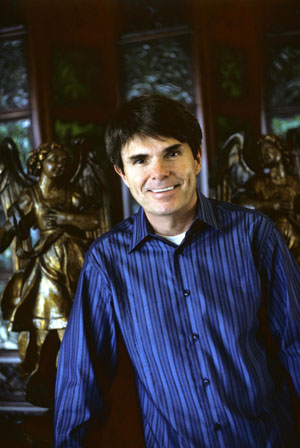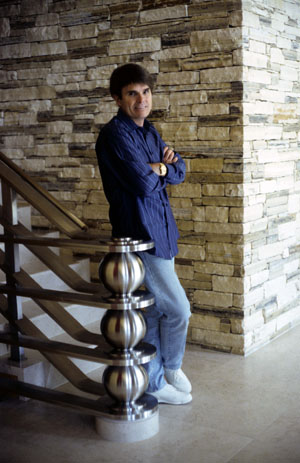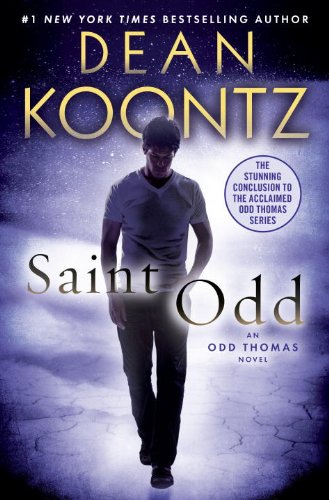Pursuit: Best-selling author
Definition of success: “Taking satisfaction from the work itself, not from what anyone else thinks of it.”
I’ve always resisted the cliché, ‘Today’s guest needs no introduction.’ And there are two reasons for that: for one thing, it’s one of those remarks that needs qualifying, and in so doing I think I’d end up at odds with the aforementioned claim. For another, those who need no – or little – introduction often provide the meatiest substance for an opening paragraph, and my guest today is no exception. Frankly, we’re in the presence of greatness – honestly, it’s true. He’ll shake his head at me for using such lofty rhetoric, I know, because despite his vast achievements he seems to have remained somehow unpretentious – at the very least down-to-earth. And in case you’re wondering at the magnitude of said achievements, permit me a small instruction. Go to Wikipedia and search: ‘Best-selling fiction authors.’ You’ll see a list populated by such revered denizens as William Shakespeare, Leo Tolstoy, Agatha Christie and a host of other authors endlessly cited by literature professors the world over. Well I’ll tell you something: today’s guest currently occupies the number seventeen spot on that roster, and by the figures quoted therein has sold around 400 million books. Take into account that some of the literary heavyweights above him on that list have been in print for several centuries, and that’s quite an achievement. But – every achievement starts somewhere, so to tell us how it all began allow me to hand over to the one and only: Dean Koontz.
“I was writing stories when I was 8 and selling them to relatives and neighbors,” Dean says. “I was writer, agent, and publisher all in one – and, I am quite sure, also a pest. I wrote in high school, and one of my English teachers, Winona Garbrick, encouraged me. In college, I won a top prize in a national college-student writing contest sponsored by the Atlantic Monthly, and I sold that same story to another magazine for $50, which was more money then than it is now and which allowed me to buy about a hundred paperbacks.
“We were quite poor, and therefore through high school I had held part-time jobs of one kind or another, during which I realized that I would never be happy working under a boss. After college, during the two years I taught school, that realization was reinforced on a daily basis. The education bureaucracy frustrated me. My wife, Gerda, said, “I know you want to write. I’ll support you for five years, and if you can’t make it in that time, you’ll never make it.” To this day, I am humbled by her generosity and her faith in me. I accepted her offer – and was immediately labeled a lazy, shiftless bum by many in our families!
“So you might say that in the early years, I was inspired by the need to be my own boss and to work at a task I loved instead of at some job that had no purpose for me except to pay the bills. During a lonely childhood, in a dysfunctional family, books had been my escape and salvation; therefore, to make a life of books was as close to bliss as I expected to get in this world.”
You know the old saying: ‘A writer writes.’ It might have some truth to it, but in most cases a successful author has to have a lot more tools on his belt than just fancy words. It’s clear though that for Dean, the writing part is a priority, with marketing and the associated press falling behind as a distant second.
“I spend very little time doing marketing/publicity. I may be the only writer regularly on the U.S. best-seller lists who has never done a national tour. Many do one for every book. I do a minimum of TV, but I do a radio tour for every book, sometimes as few as 25 ten- and fifteen-minute interviews, sometimes as many as 50. For radio, I can sit in my office – in my pajamas if I wish! – and reach several million people in one six-hour tour. I am not fond of publicity and, therefore, frustrate my publishers. As for writing, I spend 55 to 60 hours a week writing and revising what I write. When I’m nearing the end of a book and am swept away by the story, I can for a few weeks spend 70 hours at the keyboard and not be exhausted. I enjoy storytelling, and I’m enchanted by the beauty of the English language, so that although writing is hard work, it is also play.”
As you might have interpreted, it’s not the hours spent at the keyboard that Dean most begrudges.
“The loss of anonymity is the biggest,” he replies when I ask what sacrifices he has made. “If I had been smarter in my youth, I never would have allowed photographs of me to be used on book jackets, and in TV appearances I would have worn a fake beard and an eye patch! When you work the hours I do, there’s also a loss of leisure time. On the plus side, staying busy has kept me out of trouble with the cops.”
Aspiring authors – and I know there are plenty of you out there, keep up the good work! – will have noted the lessons to be learned here, the professional pitfalls to avoid. But what I really want to know is: what’s it like to be Dean Koontz – a day-in-the-life, if you will?
“Gerda and I are both early risers,” Dean obliges. “We’re up each morning at 5:45. I shower and walk the dog. By 6:45 I’m having breakfast at my desk, during which I read a couple of newspapers. I’m writing by 7:15. I rarely have lunch because food at mid day makes me sleepy. I work until 5:15 or 5:30. I usually put in at least five hours on Saturday. Evenings are never for work, nor is Sunday, but I seldom have other time off during the writing of a novel, because when I spend a few days away from a story, I need a week to find the mood and flow of it again. Between books, I’ll take off a few days.”
I know what you’re thinking: the man knocks out a lot of words of words. I find myself wondering how many keyboards Dean has gone through over the years. Still, worthy sacrifices if you ask me, because all that tapping away has seen fourteen of his novels hit the number one spot on the New York Times hardcover bestseller list, sixteen in paperback. That’s just the tip of the iceberg though: his books have sat atop best seller lists the world over, been made into countless films, achieved acclamation in the global press that has exhausted all the superlatives present in the English language – hang on, probably most other languages too come to think of it. As such, it feels almost unfair to ask him to pick out his single proudest achievement. I shouldn’t have such reservations though, for Mr Koontz does not hesitate in his response.
“My 48-year marriage and still counting. I’m still amazed that I conned a beautiful, intelligent, witty young woman into marrying me and that I’ve cunningly managed to sustain her delusion that she could have done no better than me.”
Let’s be clear here: Dean Koontz spends most of his time writing. When he isn’t writing he’s with his wife and his dog (speculation on my part, but I suspect two of his most cherished individuals). In other words, he’s either pursuing the act he loves, or else is in the company of those he loves. In fact, as one who works from home, it’s logical to posit both facets come regularly together. I’m saying it’s a good life, right? But look, I have to ask – because I ask everyone – doesn’t he sometimes, just once in a while, envy those nine-to-fivers pursuing a more routine way of life?
“No. I came from poverty, from a home without running water and without a bathroom until I was eleven. The heating was so bad that water left in a bedside glass could be frozen when I woke up on a winter morning. We never knew if we would have money for food the following week, and in those days there was no social safety net. Now Gerda and I give away a significant part of what we earn, and we have a foundation that will continue that philanthropy with the proceeds of our estate when we’re gone. I do work about which I am passionate, and it resonates with readers to such an extent that I receive on average 20,000 snail-mail letters per year. The world seems to be falling apart around me, but as a novelist, I am able to pretend to make it whole again, make sense of it when it seems the most senseless, and in knitting up the unraveling world with words, I keep myself in a condition of hope that I might not have if I were still ensnared by the educational bureaucracy or managing a widget factory.”
So we have in our midst someone who clearly has it all worked out. What, then, is the Dean Koontz definition of success?
“Taking satisfaction from the work itself, not from what anyone else thinks of it. After a writer works hard and does his best, he needs to be content with whatever consequences ensue – sometimes great rewards, sometimes meager ones. If he can measure himself not against the achievements of others but against his own past work, and if he can honestly say his work steadily improves, that makes the effort so worthwhile.”
And Dean’s advice to those of us starting out on our own path to success?
“This is a fallen world. In any career, you will encounter fools and knaves, those who envy and those who hate for no good reason, those who deceive you and those who obstruct. Don’t play their game. Be pleasant to everyone you encounter. When you realize that certain people are malevolent, find a way around them, ease them out of your life, and move on. Do not get caught up in tit-for-tat. Do not waste time in resentment and bickering. You have one journey through this wondrous world, and you can’t make the most of it if you let disturbed and malicious people play psychic vampires to your willing victim.”
My sincere thanks to Dean Koontz for his time and for the candid insight into his world, which I have no doubt will prove inspirational to all the would-be writers out there, and, I suspect, everyone keen to make their mark on this world. My thanks also to Linda Cronin for her assistance in arranging this interview.
If you’d like to find out more about Dean Koontz, his values and his books, go to www.deankoontz.com. You can follow Dean on Twitter @deankoontz or Facebook at facebook.com/deankoontzofficial
Dean’s latest novel Saint Odd, finalé to the wildly successful Odd Thomas series, is released January 13th and can be ordered by clicking the link below.
If you’re a Dean Koontz fan, none of this is news to you and you already have your pre-order in place. If, however, you’ve yet to discover this author’s mastery of horror fiction, allow me to point you in the direction of my first introduction to his work many years ago and a novel called Hideaway. Find it, read it: you’ll thank me for it.




2 Comments
Sally Cronin
Excellent interview Matt of one of my long time admired authors. Dean Koontz is not only a prolific and exceptional author but also comes across as generous and down to earth. If I am envious, it is because I would certainly like to count this exceptional man amongst those that I have interviewed. But I wholeheartedly congratulate you on having a platform that this publicity shy writer felt comfortable inhabiting.
Annelisa
Excellent insights into a great writer! And some inspirational quotes that should be repeated for their truth! 🙂